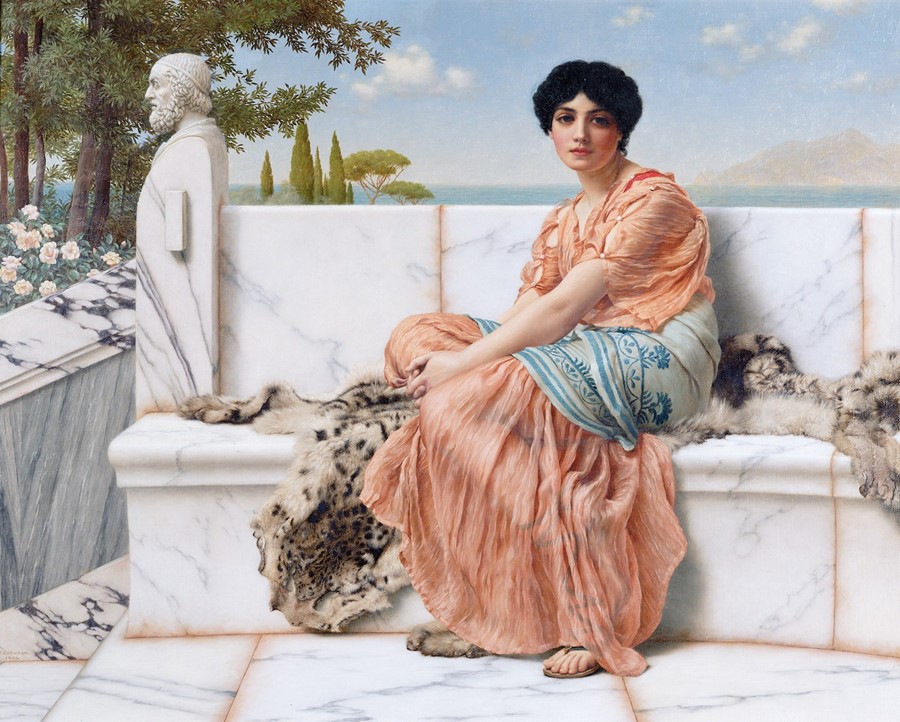As fragments of her poetry go on display at Oxford’s Bodleian Library, we recount some of Sappho’s most elegiac lyrics
Sappho is the first female writer known to Western civilisation. Her lyrical poetry, intended to be performed with a lyre accompaniment, mused on erotic and romantic love, potently communicating the bittersweet longing and “limb-loosening” sensation of falling for one’s heart’s desire. Indeed, such elegiac descriptions remain as poignant today as they did in 7th century BC. Born on the Greek Island of Lesbos, little else is known about Sappho’s life; yet the poetess remains immortalised through her verse. Odes to Aphrodite and the women she adored would coin the words ‘Sapphic’ and ‘Lesbian’: the former referring to the structure of her stanzas and the latter pertaining to the island of her origin. Ultimately, Sappho became a gay and feminist icon. As Judith Butler once remarked: “As far as I knew, there was only me and a woman called Sappho.”
Just 650 out of the 10,000 lines of her poetry survive today in written form, with much of it rumoured to have been burned by the church – naturally, many theologians considered Sappho to be “a sex-crazed whore who sings of her own wantonness”. Some of this is now on display at the Bodleian Library in Oxford University, as part of a new exhibition celebrating the centenary of women’s suffrage. Titled Sappho to Suffrage: Women Who Dared, and curated by Dr. Senia Peseta, a professor of modern history at St. Hugh’s College, it presents a selection of objects made, commissioned, written, or primarily used by women from a period spanning 2,000 years. “It’s not a whole poem, it’s fragments of a poem,” she explains of Sappho’s contribution. “It is poetry that survived one thousand years after her lifetime, found in a rubbish dump in Egypt one hundred years ago. It was then acquired by the Bodleian and they have been piecing together these fragments ever since.”
“The thing about Sappho that is interesting is that we only knew about her through things that were written by her contemporaries,” Peseta continues. “This is one of the very, very few things that physically exists of her actual poetry so it’s absolutely extraordinary.” Whilst we highly recommend planning a trip to visit the library, here are ten of Sappho’s most beautiful lyrics to peruse in the interim. And if this only leaves you wanting more, we would also suggest following Sappho Bot on Twitter, too.
- “May I write words more naked than flesh, stronger than bone, more resilient than sinew, sensitive than nerve.”
- “If you are squeamish, don’t prod the beach rubble.”
- “What cannot be said will be wept.”
- “Once again love drives me on, that loosener of limbs, bittersweet creature against which nothing can be done.”
- “You may blame Aphrodite, soft as she is, she has almost killed me with love for that boy.”
- “Virginity, virginity, when you leave me, where do you go? I am gone and never come back to you. I never return.”
- “When wrath runs rampage in your heart you must hold still that rambunctious tongue!”
- “The moon and the Pleiades have set, it is midnight, and the time is passing, but I sleep alone.”
- “All the violet tiaras, braided rosebuds, dill and crocus twined around your young neck.”
- “Someone will remember us, I say; even in another time.”
Sappho to Suffrage: Women Who Dared is open at the Bodleian Library, Oxford until February 3, 2019.
